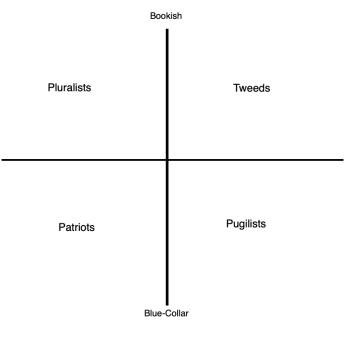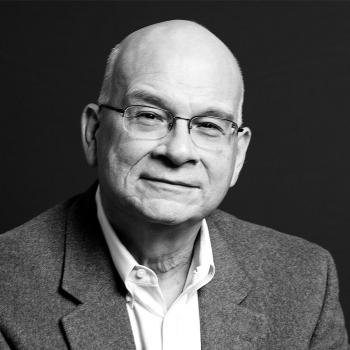 The claim “wokeness is like a religion” has become a standard one. “Wokeness” may be an ambiguous term—though I think most of us can recognize it as the overwhelming post-2015 emphasis, among progressives, on historical injustice and power relations, coupled with a rejection of traditional liberal values like freedom of speech—but many of us have developed a detailed familiarity with certain of its elements. There’s the account of “white privilege” that bears an unmistakable resemblance to talk of original sin. There are the confessional apologies couched in ritualistic language. There are the priestly figures presiding over endless training sessions, insisting on inner moral transformation in lieu of real-world “solutionism.” And so on it goes.
The claim “wokeness is like a religion” has become a standard one. “Wokeness” may be an ambiguous term—though I think most of us can recognize it as the overwhelming post-2015 emphasis, among progressives, on historical injustice and power relations, coupled with a rejection of traditional liberal values like freedom of speech—but many of us have developed a detailed familiarity with certain of its elements. There’s the account of “white privilege” that bears an unmistakable resemblance to talk of original sin. There are the confessional apologies couched in ritualistic language. There are the priestly figures presiding over endless training sessions, insisting on inner moral transformation in lieu of real-world “solutionism.” And so on it goes.
Many of those who pick up John McWhorter’s new book Woke Racism: How a New Religion Has Betrayed Black America will sympathize with this account. McWhorter, a linguistics professor at Columbia and frequent contributor to The Atlantic, has little time or patience for the moralistic cant of today’s progressive activists, which he views as expressions of a single totalizing dogma:
Battling power relations and their discriminatory effects must be the central focus of all human endeavor, be it intellectual, moral, civic, or artistic. Those who resist this focus, or even evidence insufficient adherence to it, must be sharply condemned, deprived of influence, and ostracized.
This creed McWhorter dubs “Electism,” with the goal of connoting both Calvinist religiosity and pervasive sanctimony. (I’m not especially fond of this moniker. As I’ve written before, I think the most precise term would probably be something like “antikyriarchy,” to borrow a word from Elisabeth Schüssler Fiorenza—the rejection of hierarchical social structures across-the-board. But set that aside. After all, “antikyriarchy” doesn’t exactly roll off the tongue.) The Elect faith, according to McWhorter, has no place in American public policy, and his criticism of it is vicious: “A new religion in the guise of world progress is not an advance, it is a detour. It is not altruism, it is self-help. It is not sunlight, it is fungus.”
In developing its critique of progressive antiracism efforts, Woke Racism hits mostly familiar beats. Among other points, McWhorter categorically rejects Ibram X. Kendi’s much-invoked view that all disparities between racial groups are the result of racism, instead preferring to acknowledge causal factors within group cultures. And for McWhorter, the stakes of getting race right are very high. To fall back on platitudes is to leave real challenges facing the Black community entirely unaddressed—an intolerable abdication.
On that front, one of the most elegant aspects of McWhorter’s book is its avoidance of the traditional “last chapter problem”: in lieu of sprawling, ill-defined proposals, he argues that the Black community would be best served by ending the war on drugs, stressing phonics-based reading education, and expanding vocational training opportunities. These proposals—particularly the phonics one—are interesting and straightforward rejoinders to progressive insistence on a fundamental “reckoning” in American life.
In weighing the merits of McWhorter’s thesis, I’m under no delusion that the targets of his critique will even admit that Electism (or antikyriarchy, or whatever term one prefers) is a discrete “thing.” And, of course, this is precisely the point: the most effective ideology is the one that denies that it is an ideology in the first place. It’s far more compelling to argue that Electism is a “natural” extrapolation of the moral principles latent within Rawlsian liberalism, or Christian theology, or what have you.
But I don’t find such denials persuasive. The explosion in usage of the movement’s signature terms and concepts circa 2015 (a moment that has been nicknamed the “Great Awokening”) seems to me to be powerful evidence of the movement’s independent reality. “Electism” is a thing, although the precise nature of that thing is a question all its own.
In the years since the Great Awokening, two basic intellectual genealogies of this movement have emerged. One is largely materialist, while the other is theological. On the one hand, James Lindsay and Helen Pluckrose—among many others—trace Electism back to the critical theorists of the Frankfurt School, and back further still to Karl Marx and Antonio Gramsci. On the other hand, Joshua Mitchell in American Awakening treats the movement as principally an outgrowth of Christian religiosity, though the movement offers a spirituality stripped of the possibility of transcendent justice.
There’s some overlap between these two genealogies, to be sure, but they’re distinct in an important way. For those of a politically conservative disposition, the first narrative is distinctly appealing because it allows Electism to be conceived as principally an alien influence—a poisonous European philosophy that has colonized innocent American minds. The second narrative is much harder to swallow, because it forces critics of wokeness to feel the sharp edge of Friedrich Nietzsche’s famous charge: that Christianity leads inevitably to the absolute valorization of victimhood, and so destroys glorious cultures and civilizations in the process. Far easier for the Christian conservative to fall back on the first genealogy; that path allows Electism to be rejected in toto without having to reckon with the central place of the poor and downtrodden in Christian thought.
I think the second genealogy is closer to the truth. McWhorter (and Mitchell) are right that Electism bears the mark of a profoundly Christian inheritance. Perhaps most notably, one of the central axioms of Electism—that all those individuals considered “persons” possess infinite individual depths from which their identities emerge—is of clearly Christian provenance; this emphasis on the sheer value of the individual is not found in earlier Hellenistic or Vedic spiritualities. And then there are all the other parallels—such as the concept of inherited moral guilt—that McWhorter identifies.
As noted, McWhorter leaves his own argument somewhat underdeveloped, and I suspect that a brief foray into metaphysics might ground a significantly stronger version of his claim. One can identify, for instance, a distinct anthropology and soteriology that follows from Elect logic. While Electism has assimilated plenty of elements of prior progressive scholarship—the Frankfurt School’s indictments of mass culture, the power-critiques of the experimental university at Vincennes, the Black Power tradition of the 1970s, the multiple waves of feminist thought, and so on—its philosophical trajectory is decidedly post-materialist. In its insistence that our physical traits and circumstances always bear the scars of history, and that a full reckoning with that damage is unattainable in principle, Electism inevitably trends toward a longing to transcend nature altogether.
Crucially, such a longing is not a desire for communist utopia, but for something akin to the divine simplicity—a state of pure consciousness, unconditioned by hierarchical relations, stripped of those material limitations that impede the manifestation of the pure Self. Here there is a fascinating convergence with the fever dreams of Silicon Valley: in place of a worker’s paradise, why not build a version of Black Mirror’s San Junipero? One can readily imagine a world of digitized consciousnesses, dwelling eternally within simulated realities where one can express oneself as one chooses and literally reorder the world to one’s liking. Something like this kind of immanent paradise would seem to be, at least in principle, the horizon toward which Electism strives.
And one can similarly extrapolate Elect logic into the domain of fundamental ontology. Where hierarchies among humans are not relativized by some transcendent reality, all beings must find themselves bound together in a tortuous matrix of oppressors and oppressed, something rather like the Buddhist conception of pratītyasamutpāda (“dependent co-arising”). As Michel Foucault phrased it, “the network of power relations ends by forming a dense web that passes through apparatuses and institutions, without being exactly localized in them[.]” It would seem to me that the only real way beyond this web of power relations is to minimize one’s interactions with the “other”—possibly through some kind of digital emancipation.
In short, McWhorter’s core argument strikes me as fundamentally correct: the beating heart of Electism is religious-type conviction, with a distinctive world-picture offered to its adherents. Certainly Electism is post-Christian in many ways, but its essentially individualistic roots stretch far down into Christian soil. And McWhorter is right, in the closing pages of his volume, to acknowledge the necessary incommensurability of Elect dogmatic views with his own. He writes that, “[t]he conflict here is, regrettably, not as simple as one that could be resolved by telling the Elect to just listen,” and given the radical difference in premises between McWhorter and his targets, he is certainly correct. Something similar could be said of much—though not all—dialogue between adherents of rival intellectual traditions.
But alas, it must be noted that McWhorter’s book suffers from a profoundly impoverished view of what religion actually is. Like so many other “anti-woke” resources that position themselves as heirs to the Enlightenment’s intellectual inheritance, McWhorter frames the conflict between classical liberalism and Electism as a struggle between rationality and irrationality. He even opines at one point that “[w]idespread beliefs founded in transparently irrational assumptions, fiercely held by otherwise empirical people, for ulterior, transcendent reasons, are religion.”
There’s plenty to unpack here, and none of it good. For one thing, McWhorter assumes without basis that the category of “religion” entails an appeal to the irrational, rather than (more accurately) an appeal to the axiomatic or foundational. Such a claim betrays a profound ignorance of the history of Western and Eastern religious philosophy alike: on what conceivable account could figures like Plotinus or Thomas Aquinas or Adi Shankara be credibly described as fideists? For another, McWhorter entirely ignores the thrust of the “woke” (or, more neutrally, the postmodern) critique: what counts as “rationality” has inevitably been conditioned by history and desire. It wasn’t for nothing, after all, that Alasdair MacIntyre wrote a lengthy volume entitled Whose Justice? Which Rationality?
McWhorter appears entirely untroubled by such questions. Instead, he thunders that “[t]here is nothing correct about the essence of American thought and culture being transplanted into the soil of a religious faith,” and declares that woke-religious claims are no “more appropriately imposed by fiat on the general public than would be a prohibition against consuming alcohol, or, more to the point, against abortion, or a requirement that one not mix milk and meat. These are matters of private choice.” But this fails to comprehend the structure of moral reasoning even within a liberal-democratic order. Arguments about public policy must inevitably “bottom out” in foundational claims (appeals to human rights?) that can only be described as “religious.” The only question is whether they will be acknowledged as such.
In any case, it is long past time to retire these warmed-over, New Atheist-inflected polemics about religion and the Enlightenment. Not only are they profoundly sloppy, they raise serious questions about the extent to which “Intellectual Dark Web” figures can make common cause with individuals of traditional faith. And since abstract appeals to a neutral “rationality” don’t even address the kernel of the Elect position in the first place, they amount to little more than preaching to an invisible choir.
That’s not to say that Woke Racism is meritless. Read in a charitable light, McWhorter has written an engaging book that makes some sound points, and that displays a rather better understanding of the relevant issues than Lindsay and Pluckrose’s Cynical Theories. Furthermore, I’d happily read a longer treatment of his proposed alternatives to Electism—say, about the importance of teaching traditional phonics as a means of advancing social justice. Given McWhorter’s background in linguistics, I can imagine such a book being both a compelling read and a policy paradigm-changer.
If he plans to write about religion again, though, I do hope he takes the time to crack open the Summa Theologica or the Book of Concord before doing so. Who knows? He might find out that “ulterior, transcendent reasons” for beliefs are the only ones that really matter in the end.












